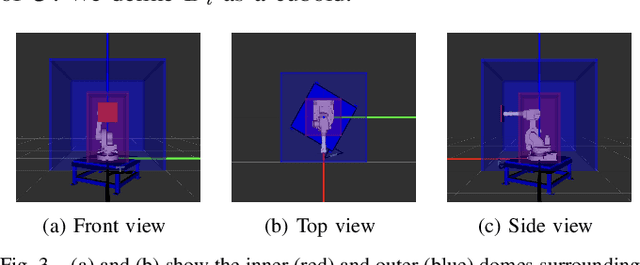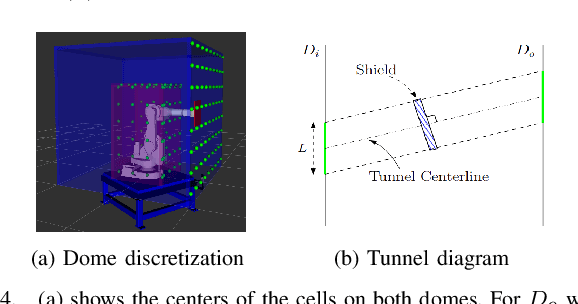Hanlan Yang
Preprocessing-based Kinodynamic Motion Planning Framework for Intercepting Projectiles using a Robot Manipulator
Jan 16, 2024



Abstract:We are interested in studying sports with robots and starting with the problem of intercepting a projectile moving toward a robot manipulator equipped with a shield. To successfully perform this task, the robot needs to (i) detect the incoming projectile, (ii) predict the projectile's future motion, (iii) plan a minimum-time rapid trajectory that can evade obstacles and intercept the projectile, and (iv) execute the planned trajectory. These four steps must be performed under the manipulator's dynamic limits and extreme time constraints (<350ms in our setting) to successfully intercept the projectile. In addition, we want these trajectories to be smooth to reduce the robot's joint torques and the impulse on the platform on which it is mounted. To this end, we propose a kinodynamic motion planning framework that preprocesses smooth trajectories offline to allow real-time collision-free executions online. We present an end-to-end pipeline along with our planning framework, including perception, prediction, and execution modules. We evaluate our framework experimentally in simulation and show that it has a higher blocking success rate than the baselines. Further, we deploy our pipeline on a robotic system comprising an industrial arm (ABB IRB-1600) and an onboard stereo camera (ZED 2i), which achieves a 78% success rate in projectile interceptions.
A-ePA*SE: Anytime Edge-Based Parallel A* for Slow Evaluations
May 08, 2023


Abstract:Anytime search algorithms are useful for planning problems where a solution is desired under a limited time budget. Anytime algorithms first aim to provide a feasible solution quickly and then attempt to improve it until the time budget expires. On the other hand, parallel search algorithms utilize the multithreading capability of modern processors to speed up the search. One such algorithm, ePA*SE (Edge-Based Parallel A* for Slow Evaluations), parallelizes edge evaluations to achieve faster planning and is especially useful in domains with expensive-to-compute edges. In this work, we propose an extension that brings the anytime property to ePA*SE, resulting in A-ePA*SE. We evaluate A-ePA*SE experimentally and show that it is significantly more efficient than other anytime search methods. The open-source code for A-ePA*SE, along with the baselines, is available here: https://github.com/shohinm/parallel_search
 Add to Chrome
Add to Chrome Add to Firefox
Add to Firefox Add to Edge
Add to Edge